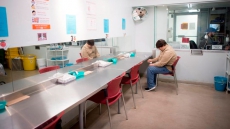EDMONTON — Hailey Hague only has to look at her healthy, energetic six-year-old to know the importance of organ donation.
Soon after Lily was born, she was diagnosed with biliary artresia — a disease that affects about one in every 10,000 to 20,000 infants.
"Right before Lily hit three months, she went into end-stage liver failure," says Hague. "Her eyes completely went yellow ... and she was sleeping. We had to purposely wake her up to feed her and that's not normal."
The next day, they found out her liver wasn't working and she might need a liver transplant.
Organ donation has been in the spotlight the last year after the Humboldt Broncos bus crash in Saskatchewan left 16 people dead and 13 injured. One of the players, Logan Boulet of Lethbridge, Alta., had signed up to be an organ donor in the weeks before the crash and his parents followed through with his wishes.
Six people across Canada benefited from his organs. What has been called the Logan Boulet Effect soon followed.
Canadian Blood Services estimates that nearly 100,000 Canadians registered to become organ donors after the Humboldt crash and the story of Boulet's donation. Another 50,000 people registered in May.
The head of the David Foster Foundation, which provides financial support to families with children who need organ transplants, says Boulet's death shows the importance of organ donation.
"Through tragedy has come action," says Michael Ravenhill. "Because of that one young man's selfless act, he has actually changed the landscape of organ donation in Canada."
An event called Green Shirt Day is planned for every April 7, the anniversary of Boulet's death, to promote organ donation.
The Canadian Institute for Health Information says the country has a shortage of organs, with 4,333 patients waiting for transplants. In 2017, 242 Canadians died while waiting for a transplant.
The Hague family's experience was in 2013. They moved to Edmonton from Abbotsford, B.C., to be closer to Stollery Children's Hospital where Lily could get a transplant assessment.
Family members were willing to donate part of their liver, but Lily's portal vein — the main blood vessel to the liver — wasn't working properly and a living donor can't provide one.
"She got moved to the transplant list because she needed a deceased donor," says her mother.
After an infection, Lily was given three months to live and was bumped up on the transplant list.
"We needed to find her a donor. We needed to do something or she was not going to be here anymore," said Hague. "I felt like I had the wind knocked out of me."
Lily was transferred to Toronto's SickKids Hospital for treatment while she waited for a donor.
"It was a blessing in disguise," Hague says. "They told us about this new procedure ... they could use the living donor's liver and then they could take deceased vessel from someone who has passed away to create a portal vein."
A liver donation would still be her best chance at survival, but now they had another option if the next liver went to another patient.
And that's what happened.
When Lily was seven months old, her mother gave her 22 per cent of her liver.
"Somebody else, a little boy I think it was, passed away. His liver went to somebody else and his vessels created Lily's portal vein," says Hague. "It's amazing that they could do that."
A lot of people tell her that she's her daughter's hero.
"I don't know," she says. "I like to think of the little boy who donated his organ, his parents donating his organs — that's her hero. I'm her mom."
Hague says she's encouraged by the recent focus on organ donation.
In addition to Green Shirt Day, Nova Scotia announced legislation last week that would have all residents be potential organ donors unless they opted out. It's believed Nova Scotia would be the first jurisdiction in North America to adopt the measure.
Hague says she hopes every province follows suit.
"Oh my gosh, please, everywhere," she says. "If everyone were an organ donor, could you imagine?"

